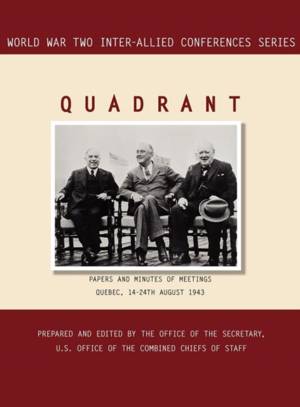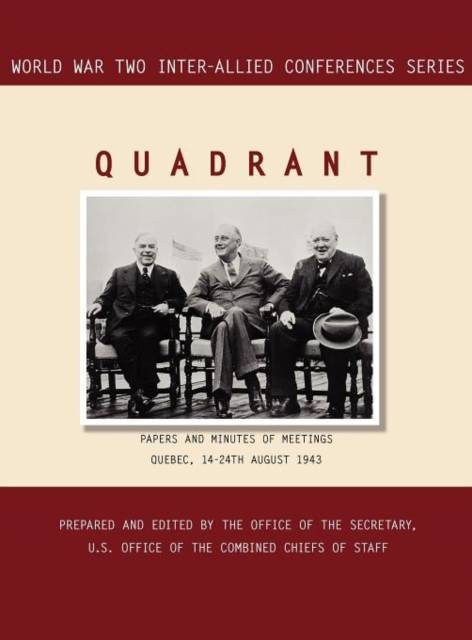
- Retrait gratuit dans votre magasin Club
- 7.000.000 titres dans notre catalogue
- Payer en toute sécurité
- Toujours un magasin près de chez vous
- Retrait gratuit dans votre magasin Club
- 7.000.0000 titres dans notre catalogue
- Payer en toute sécurité
- Toujours un magasin près de chez vous
Quadrant
Quebec, 14-24 August 1943 (World War II Inter-Allied Conferences series)
Inter-Allied Conferences, Office of the Secretary, Joint Chiefs of
Livre relié | Anglais
62,95 €
+ 125 points
Description
During World War II, President Franklin D. Roosevelt and Prime Minister Winston S. Churchill formulated allied grand strategy at a series of high-level conferences held in Washington, DC, Casablanca, Quebec, Cairo, Tehran, Yalta, and Potsdam. At the Tehran, Yalta, and Potsdam conferences, the Russian leader, Joseph Stalin, also played a major role. Under policy guidance from their national leaders, the newly formed US Joint Chiefs of Staff and their British counterparts, known collectively as the Combined Chiefs of Staff, hammered out the military details of allied strategy. The minutes of the Combined Chiefs' meeting at the major conferences touch on virtually every policy and strategy issue of World War II, from initial troop deployments to counter Axis aggression, through the debates about the location and timing of the principal Anglo-American offensives, to the settlement of post-war occupation boundaries. Besides being an invaluable primary source on the early years of the Joint Chiefs of Staff and on the planning and conduct of World War II, these documents also offer insights for today on the problems of managing a global coalition war. Originally highly classified documents, the minutes were declassified on October 3, 1973. QUADRANT (Quebec, 14-24 August 1943). Roosevelt, Churchill, and their military chiefs of staff decided that the cross-Channel attack, codename OVERLORD, was to be the main Anglo-American effort in Europe for 1944, with a target date of 1 May. They approved the outline plan developed by the combined Chief of Staff to the Supreme Allied Commander (COSSAC) staff and authorized preparations. The combined bomber offensive was to continue with the "highest strategic priority." At the same time, the offensive against Italy was to continue. Planning was authorized for an invasion of southern France as a companion to OVERLORD. The allies approved the U.S. schedule of operations in the Central and South Pacific and established the Southeast Asia Command in the CBI. The leaders discussed the shift of forces to the Pacific after Germany's defeat and established a twelve-month target for finishing off Japan after Germany surrendered.
Spécifications
Parties prenantes
- Auteur(s) :
- Editeur:
Contenu
- Nombre de pages :
- 542
- Langue:
- Anglais
Caractéristiques
- EAN:
- 9781780394855
- Date de parution :
- 01-09-11
- Format:
- Livre relié
- Format numérique:
- Genaaid
- Dimensions :
- 216 mm x 279 mm
- Poids :
- 1533 g

Les avis
Nous publions uniquement les avis qui respectent les conditions requises. Consultez nos conditions pour les avis.






